
Cut Above The Rest
By Andrew Joseph, Features Editor
Automation Aesus Delft Blue Greydon Mettler-Toledo Safeline Praxair Reiser Sealed Air Shawpak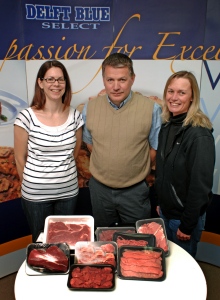
Photo by Cole Garside
As one of Canada’s leading processors of fresh and value-added veal products, the Cambridge, Ont.-headquartered Delft Blue, a division of agrifoods group Grober Inc., has long enjoyed being ahead of the curve when it came to product, process and packaging innovation—rightfully helping itself to all the due rewards strong industry leadership brings with it.
And while many of the company’s meat-processing competitors are only beginning to jump aboard the environmental sustainability bandwagon, for Delft Blue president Arie Nuys, operating a successful manufacturing enterprise without leaving a messy environmental footprint behind has alway been the right way to do business.

Photo by Cole Garside
“Sustainability is the big buzzword today, but we can proudly say that we have been producing a sustainable product since the 1970s,” Nuys told Canadian Packaging on a recent visit to the company’s Cambridge operations, which have recently taken their environmental credentials to yet another level.
GREEN MILE
“We have made a significant investment into a ‘green energy’ project, whereby we transform the manure waste from the calves on one of our farms into electricity,” explains Nuys, adding that the Delft Blue Farms Bio-Gas project will start supplying 500 kW to the local electricity grid later this spring—enough to supply power to over 500 homes in the Cambridge area.
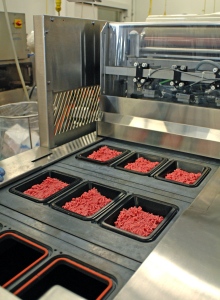
Photo by Cole Garside
Such respect for the environment is perfectly fitting for a company that has earned its bread-and-butter since opening up in 1978 by supplying Canadian consumers and households with a tasty, versatile and low-fat meat option packed with healthy proteins, amino acids, iron, zinc, Vitamin B12 and other key nutrients deemed essential to a healthy eating.
While veal is still the 45,000-square-foot manufacturing plant’s biggest meal ticket, the Hazard Analysis Critical Control Point (HACCP)-certified building—also housing the administrative offices and sharing space with a 10,000-square-foot right warehouse next to it—also processes other value-added meat products such as lamb, pork, poultry and rabbit, Nuys relates.
Operating on a 12-hour-shift, five-days-per-week schedule, the 120-employee Cambridge plant is one of four meat-processing factories owned by Delft Blue, including the Proveal plant in Milton, Ont.; an Ecolait Ltee. facility in Terrebonne, Que,; and a U.S.-based sister plant in New York Mills, N.Y.
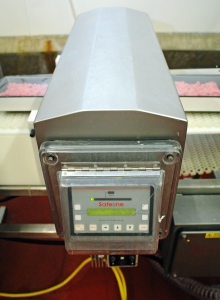
Photo by Cole Garside
At the height of its busy summer-time season, Nuys relates, the Cambridge operation boosts its workforce to about 200 people to keep up with soaring demand for many of its various barbecue-friendly products—marketed under the company’s own Provitello and Delft Blue flagship brands and, increasingly, co-packed under private labels for growing ranks of customers in the retail, foodservice and butcher-shop trades.
According to Nuys, much of this expansion can be credited to the company’s decision to enter the case-ready and value-added segments of the meat market about 12 years ago.
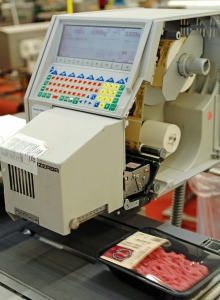
Photo by Cole Garside
CASE MADE
“That has certainly enabled us to become a leading supplier of fresh, case-ready, milk-fed and grain-fed veal for the majority of Canada’s top retailers, butchers and foodservice industries,” says Nuys, “and we also leveraged this innovation to create successful co-packing opportunities for us.”
The Cambridge plant today houses a total of seven packaging lines—including two vacuum-packing lines, three overwrapping lines, one for fresh meat with a layerwrap, and two for MAP (modified-atmosphere packaging) applications—with the MAP lines playing a key role in driving the plant’s business success in recent years, according to Cambridge plant manager Daphne Nuys-Hall.
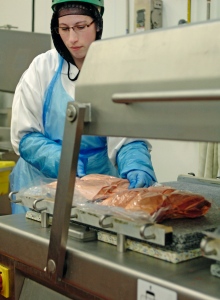
Photo by Cole Garside
“The MAP packaging format has reduced the need for further-processing of the meat at the supermarket level, and it allows us to deliver our product on a seven-days per-week schedule,” states Nuys-Hall.
“It’s a great technology for ensuring the freshness and quality of our product, while reducing the cost for the supermarkets,” she says, citing the benefits of increased product shelf-life and enhanced consumer appeal achieved with an attractive, see-through package that informs consumers instantly exactly what they are purchasing.
A little less than two years ago, Nuys-Hall relates, the Cambridge plant decided to upgrade the case-ready side of its business with an installation of a new Ross Inpack S Series S45 tray-sealer system manufactured by the Canton, Mass.-headquartered food packaging equipment specialists Reiser, purchased through its Canadian subsidiary Reiser (Canada) Ltd. of Burlington, Ont.
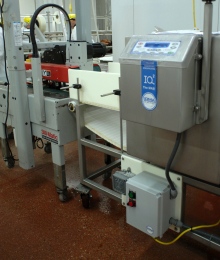
Photo by Cole Garside
Delivered to the Cambridge plant in July of 2008, the three-lane, automatic S45 machine—designed for high-speed production of MAP packages of fresh, refrigerated, retort or frozen meat products in a broad range of tray shapes and sizes—the new machine was a worthy replacement for the two-lane Ross Inpack 3180 system originally purchased back in 1997, relates Nuys-Hall.
“For us, the new S45 machine represents an opportunity to increase the MAP packaging output for our case-ready products,” says Nuys-Hall, praising the robust system’s welcome application flexibility in terms of programming, tooling, and the types of products it can package.
“Although the older 3180 model was a very good servant for us over the years,” she reflects, “we wanted a newer, faster machine that would help us further in achieving our production goals, which is exactly what the S45 has provided us.
“And because it is built completely from stainless steel, it is a very easy machine for us to clean during our daily washdowns,” adds Nuys-Hall, “so that we can maintain the high level of hygiene standards that our customers have come to expect from us.”
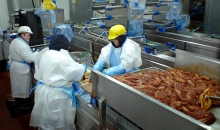
Photo by Cole Garside
With fully-automated monitoring and control of sealing time, pressure and temperature to enable consistent production of high-quality seals, the S45 machine makes optimal use of the LID1050 Lidstock multilayer lidding—made by Sealed Air Corporation’s Cryovac division—to form hermetically-sealed, tamper-evident, leakproof meat packages with extended shelf-life of eight to 10 days, thanks to an effective oxygen-barrier maintaining the desired gas mixture of 80-percent oxygen and 20-per cent carbon-dioxide, supplied by Praxair Inc., as well as two extra internal film layers inside the package.
“The S45 machine and the LID1050 film provide us with an attractive package that remains fog-free and sparkling in appearance even during refrigeration and display at the retail level—offering the consumers a full view of the meat product inside,” states Nuys-Hall.
“This is very important for Delft Blue because we know that how our product looks is very important—especially for all the first-time buyers.”
FIT TO PRINT
The S45 tray-sealer at Delft Blue works in conjunction with a newly-purchased GC-220 reciprocating ink imprinter from Greydon Inc.—a precision-built, wet ink printer designed for generating high-quality prints of variable product information on the packages, while utilizing dual-flow controls and a large air cylinder to activate a repeatable, smooth stroke that remains immune to any sudden fluctuations in air pressure.
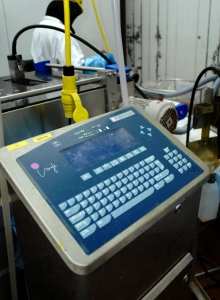
Photo by Cole Garside
All the case-ready packages coming off the Reiser machines are immediately checked for quality assurance by a pair of Safeline model metal detection conveyor systems manufactured by Mettler-Toledo Safeline—distributed in eastern Ontario by Shawpak Systems Inc.—and then labeled by one of the two Herma label applicators, manufactured by Aesus Canada.
Advertisement

